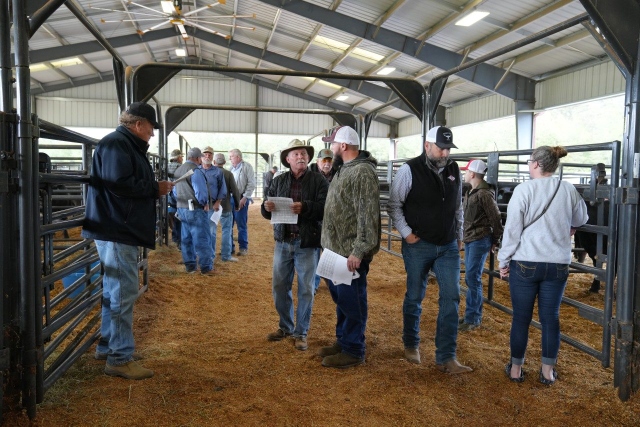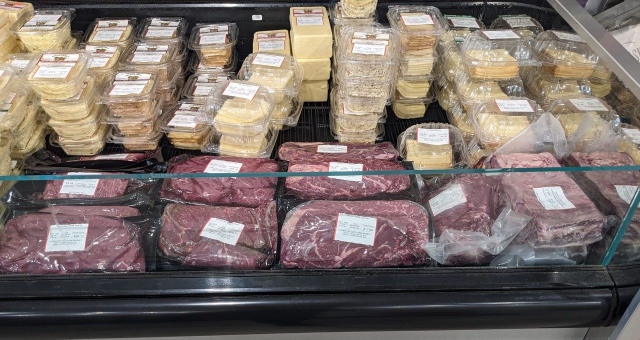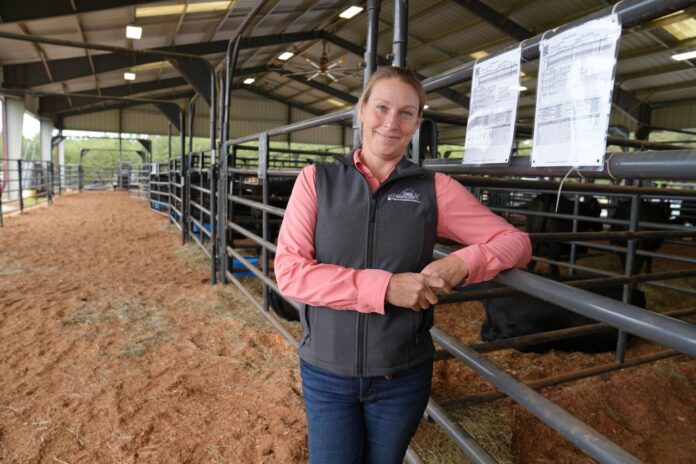On a Friday night in April, more than 130 people packed into the Buckingham Agriculture Resource Network (BARN) for a chance to bid on some of the region’s finest heifers and bulls.
Sitting at a table at the front of the BARN’s vast meeting room, Virginia Cooperative Extension Senior Agent Jennifer Ligon introduced each group of cattle for auction as a video of the heifers in a pasture played on a giant screen in the background.
Hands raised and heads nodded as auctioneer Cody Manspile called out in rapid-fire singsong: “How ’bout $3,550? $3,550? Do it one more time now. How ’bout $3,600? Don’t lose ’em now.”
For cattle farmers like Roger Morris, owner of CH Morris and Sons in Appomattox, it was a dream come true.
“Hopefully, this is going to be one of our best sales ever,” said Morris, president of the Buckingham Cattlemen’s Association. “Before we started selling our cattle together, we just carried them to the stock market and took whatever they gave us. When we bring them here, we know exactly what we’re going to get per pound for them.”
At the end of the sale, 63 Virginia premium assured heifers and one bull had sold at an average price of $3,546 each – exceeding state average prices. It was the Buckingham Cattlemen’s Association’s best production sale in the event’s 20-year history.
The cattle industry is big business in Virginia. As the commonwealth’s second-most-valuable commodity, cattle and calves generate over $695 million a year in income.
Virginia Cooperative Extension partners with beef producers across the commonwealth to ensure their livelihoods — and Virginia’s second-largest agricultural product — have a bright future. Buckingham County — where Extension has helped the 250 members of the Buckingham Cattlemen’s Association achieve bigger profits, increased purchasing power, enhanced control over their business, and best-in-class educational programming — is a prime example of that partnership at work.
Ligon is the woman who made much of it possible.

A “one-stop shop” for cattle producers
Shortly after arriving in the county as a new Extension agent in 2009, Ligon began working with BCA members to create a facility where they could meet and sell their cattle, thereby reducing expenses of transportation and hauling stress on cattle.
After obtaining 501(c)(5) status for the Buckingham Cattlemen’s Association as a nonprofit agricultural organization, Ligon secured more than $1.2 million in grants from the Tobacco Region Revitalization Commission, Virginia Department of Agriculture and Consumer Services, and the U.S. Department of Agriculture to build the Buckingham BARN and Beef Hub.
“The BARN is somewhere producers can gather for fellowship and learning and have a sense of pride because it’s theirs,” Ligon said. “Not only do producers have a place where they learn the newest trends and research to apply on their farm, but they also have a local facility they can use as a marketing tool. It alleviates some of their extra expenses in fuel and transportation costs because everything is right here.”
Today, the BARN is the only facility of its kind in the state owned by a Virginia Cattlemen’s affiliate. Centrally located in Virginia, it draws producers from 23 Virginia counties and North Carolina for sales, meetings, and nationally recognized programs led by Ligon on low-stress cattle handling, marketing, and artificial insemination. Feeder calf and production sales held at the facility over the past decade have garnered additional premiums of $3 million over market values for producers.
“I don’t think there’s anyone who works harder or does more for her producers than Jennifer,” said Virginia Cattlemen’s Association Executive Director Brandon Reeves. “She created a one-stop shop for cattle producers that has really helped grow their bottom line. Virginia Cooperative Extension is critical to helping ensure that our producers are successful and that our industry remains viable and continues to grow.”

Bringing home the beef
During the pandemic, when processing facilities scaled back and consumers increasingly sought to buy local, Ligon obtained a second grant to fund the Buckingham Beef Hub. The commercial freezer and refrigerated trailer adjacent to the BARN offer producers another avenue for selling local beef during times of market uncertainty.
To simplify the processing workload for producers, Ligon negotiated an arrangement with Lynchburg meat processor Seven Hills Food Company that allows farmers to bring their finished cattle to the BARN for cooperative transport and processing. Seven Hills then returns the beef fully processed and packaged for sale to the Beef Hub. Because of that effort, beef with the Buckingham Cattlemen’s Association label is sold in stores throughout Buckingham County, with plans for regional expansion.
With the addition of the BARN and Beef Hub, Buckingham Cattlemen’s Association (BCA) producers increased their profits by 63 percent and achieved individual savings of more than $1,800 apiece on fuel and transportation.
“It’s gratifying to see the work we do come full circle,” Ligon said. “We help these producers with artificial insemination to breed cattle with the best genetics, visit their farms to see their progress, and help them sell at the feeder calf and production sales. Then we get to see our BCA product in the local markets. It’s the full cycle.”
To help local producers better market their beef, Ligon and Cumberland Extension Agent Amber Taylor developed a program called From Field to Filet. The program walks producers through the finishing, processing, and marketing process – coaching on everything from marbling scores and beef cuts to web and social media marketing.
“The beef industry is a huge economic driver in Cumberland County,” Taylor said. “Partnering with the Cattlemen’s Association to provide research, sales opportunities, and a value-added piece so our producers get a premium for their animals has been awesome. As an Extension agent, it’s rewarding to be part of something so big and proactive and to see the knowledge we share put into action so successfully.”
Looking ahead, Ligon is focused on removing roadblocks that stand in the way of Virginia beef. Her next goal is to work with high schools and community colleges on developing processing education programs to help resolve an industrywide shortage of meat processing workers.
Alongside the Virginia Farm Bureau and Virginia Cattlemen’s Association, she has worked to negotiate more efficient trade of Virginia beef across the Canadian border.
And she aims to make the BARN – which has already brought an estimated return of $12.6 million and 180 jobs to the region – into a regional destination for agritourism events including tractor pulls, rodeos, and fairs.
“It’s been my vision to see Virginia less dependent on other parts of the beef industry that aren’t within the state,” she said. “We can do it all in Virginia if we just show people how. One day, I want to see a Buckingham Beef Steakhouse.”

Extension’s partnership with the beef industry
As an integral part of both Virginia Tech and Virginia State University, Virginia Cooperative Extension works in 107 counties and cities throughout the commonwealth. More than 380 Extension agents and specialists across the state share knowledge, support businesses, and implement research in a wide variety of subject areas to advance the well-being of all Virginians.
The Buckingham BARN is but one example of how Virginia Cooperative Extension programs support the beef and cattle industry. To learn more about beef industry programs that are led, developed, or assisted by Virginia Tech and Virginia Cooperative Extension, visit the following:
- Beef Quality Assurance (BQA) Program
- State 4-H and FFA Livestock Judging Teams
- Beef Cattle Improvement Association (BCIA)
- Virginia Cattlemen’s Association
- CattleWISE
- Virginia Beef Expo
- State Fair of Virginia
- Virginia-Maryland College of Veterinary Medicine Large Animal Clinical Sciences
- Virginia Master Cattleman Program
- Livestock Hall of Fame
- VTBeef
- Virginia Tech College of Agriculture and Life Sciences
- Virginia Tech School of Animal Sciences
By Marya Barlow

